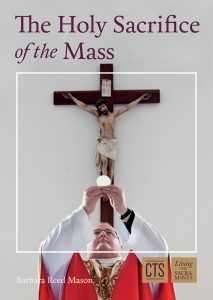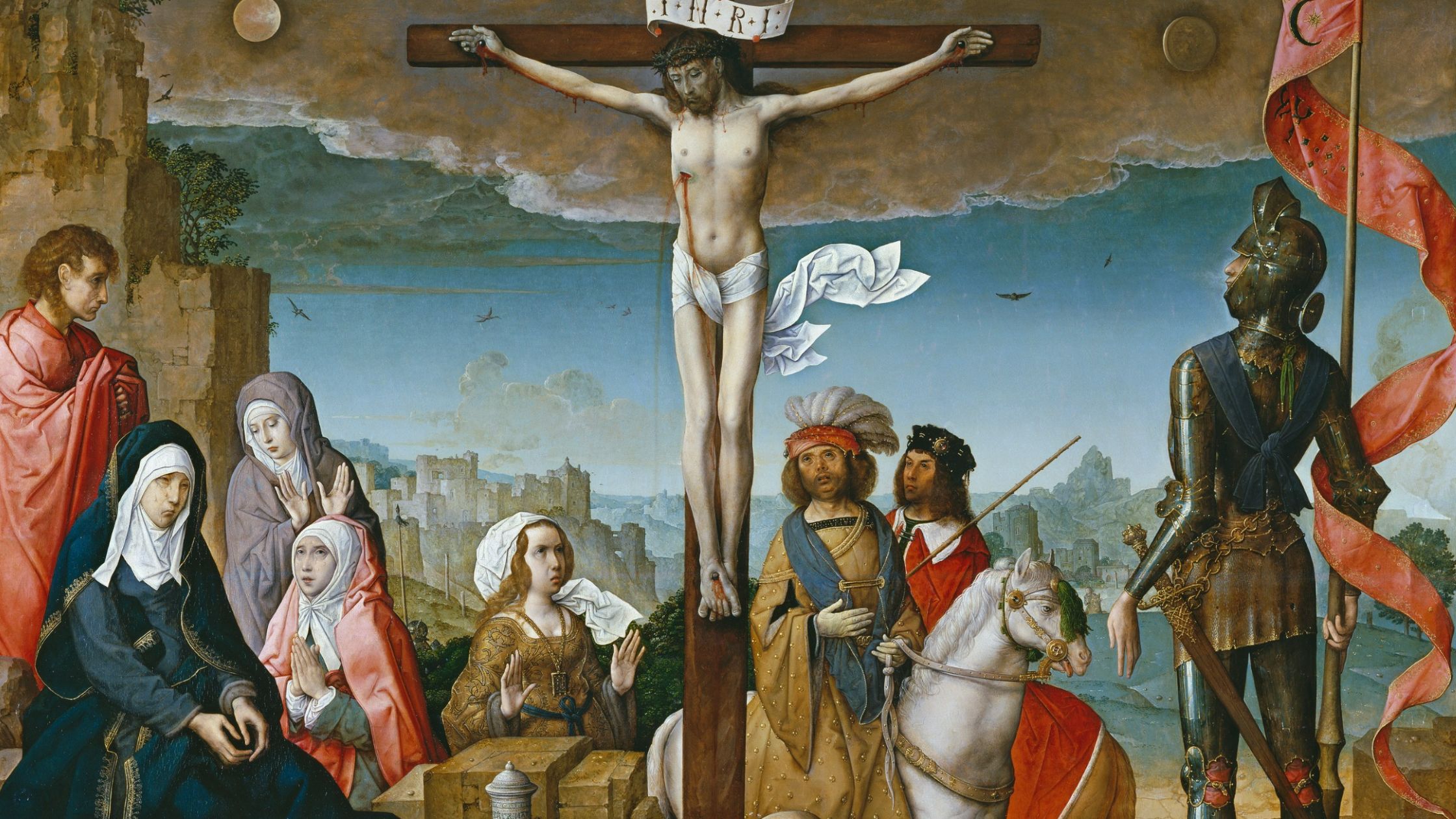God so loved the world so much that he gave his only Son, so that everyone who believes in him might not be lost but might have eternal life.
(Jn 3:16)
The “Paschal Mystery” of Christ refers to God’s plan of salvation for all humanity which was fulfilled through the Passion, death, Resurrection, and Ascension of Jesus Christ.
Jesus means in Hebrew “God saves”. At the annunciation, the angel Gabriel gave him the name Jesus as his proper name, which expresses both his identity and his mission. Since God alone can forgive sins, it is God who, in Jesus his eternal Son made man, “will save his people from their sins”. (CCC 430)
Jesus is the Word of God through whom everything was created (see Jn 1:1-3; Col 1:15-17). Since everything was created through the Word of God, everything had to be restored through the Word of God. It was man who, tempted by the devil, chose to separate himself from God; so Jesus had to become man to “take on the whole weakness of our lowly human nature” in order to restore us to union with God. Pope St Leo the Great explains why Jesus had to take on our fallen human nature:
If he who was alone free from sin had not united our nature to himself, then men would have still been held captive under the power of the devil. We would have been incapable of profiting by the Victor’s triumph if the battle had been fought outside our nature. (Pope St Leo the Great, PL 54, 791-793)
Pope St Leo the Great
The Son of God who was in the beginning with God, through whom all things were made, without whom nothing was made [(Jn 1)], became man to free him from eternal death.
He stooped down to take up our lowliness without loss to his own glory. He remained what he was; he took up what he was not. He wanted to join the very nature of a servant to that nature in which he is equal to God the Father. He wanted to unite both natures in an alliance so wonderful that the glory of the greater would not annihilate the lesser, nor the taking up of the lower diminish the greatness of the higher.
What belongs to each nature is preserved intact and meets the other in one person: lowliness is taken up by greatness, weakness by power, mortality by eternity. To pay the debt of our human condition, a nature incapable of suffering is united to a nature capable of suffering, and true God and true man are forged into the unity that is the Lord. This was done to make possible the kind of remedy that fitted our human need: one and the same mediator between God and men able to die because of one nature, able to rise again because of the other.
(Sermo 1, In Navitate Domini)
Jesus lived his entire human life obeying the word of his Father. When he died on the cross, our fallen human nature died. Because Jesus Christ is also the immortal God, his mortal body rose from the dead. On the cross, Jesus conquered sin, Satan and death: “By his death, Christ liberates us from sin; by his Resurrection, he opens for us the way to a new life. This new life…reinstates us in God’s grace” (CCC 654).
Jesus is called the “new Adam” because he initiated a new creation who will no longer die. Anyone who is born spiritually as a new creation in Christ through faith and baptism, and who remains in union with him, will live forever, just as God intended in the beginning.
The Church warns us that “this new life as a child of God can be weakened and even lost by sin” (CCC 1420). The new life in Christ is experienced when we choose to live “no longer for ourselves but for him who died and rose again for us” (Eucharistic Prayer IV). Jesus said: “If anyone wants to be a follower of mine, let him renounce himself and take up his cross every day and follow me” (Lk 9:23).
To renounce someone is to disown him. To renounce oneself is to disown oneself as the centre of one’s existence, which is the condition of the fallen human being, referred to in Scripture as the natural man, the unspiritual man, or man in the flesh. Pope Benedict XVI explained what these terms indicate: “a way of living only for oneself and according to worldly standards”.
Living only for oneself means that our own ideas, opinions, judgements and preferences are at the centre, rather than Jesus Christ, the Way, the Truth and the Life.
Living according to worldly standards means that our temporal, secular life and its concerns and pursuits are more important to us than the Kingdom of God and our baptismal vocation as disciples of Jesus.
Remaining in union with God
Once we have been baptised – immersed in God’s life and freed from the power of the evil one (the Sacrament of Baptism includes an exorcism) – we need to live our new life in the Spirit, not in the flesh:
Let me put it like this; if you are guided by the Spirit you will be in no danger of yielding to self-indulgence, since self-indulgence is the opposite of the Spirit, the Spirit is totally against such a thing, and it is precisely because the two are so opposed that you do not always carry out your good intentions. (Ga 5:16-17)
To live as new creations in Christ we need to be made more and more like him. The word of God encourages us to “die” to our old self – our fallen nature – and put on the new self:
You must give up your old way of life; you must put aside your old self, which gets corrupted by following illusory desires. Your mind must be renewed by a spiritual revolution so that you can put on the new self that has been created in God’s way, in the goodness and holiness of the truth. (Ep 4:22-24)
Scripture gives us specific instructions as to what that entails (e.g. Ep 4:24-6:17). Since the word of God is a living word, it is effective if we are open to receive it:
The word of God is something alive and active: it cuts like any double-edged sword but more finely: it can slip through the place where the soul is divided from the spirit, or joints from the marrow; it can judge the secret emotions and thoughts. (Heb 4:12)
When we nourish ourselves with the word of God, “this nourishment enlightens the mind, strengthens the will and fires the hearts of men and women with the love of God” (Dei Verbum 23).
In the liturgy, we are fed at both the table of the word and the table of the Eucharist:
The Risen Lord is encountered in the Sunday assembly at the twofold table of the word and of the Bread of Life. …[I]t is Christ who speaks, present as he is in his word “when Sacred Scripture is read in the Church”. (Pope St John Paul II, Dies Domini 39)
We must ask for the grace to respond to him.
 This post is extracted from our book Holy Sacrifice of the Mass by Barbara Reed Mason. Every time the Mass is celebrated something astonishing occurs: the Sacrifice of Jesus Christ on the Cross is made truly present. Drawing on Sacred Scripture, the Catechism, and the words of saints and popes, this book explains how the Sacrifice of the Mass unites the faithful with God.
This post is extracted from our book Holy Sacrifice of the Mass by Barbara Reed Mason. Every time the Mass is celebrated something astonishing occurs: the Sacrifice of Jesus Christ on the Cross is made truly present. Drawing on Sacred Scripture, the Catechism, and the words of saints and popes, this book explains how the Sacrifice of the Mass unites the faithful with God.
Learn more about the sacrificial nature of the Mass and support the mission of CTS, order your copy of Holy Sacrifice of the Mass now.
